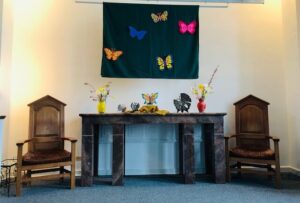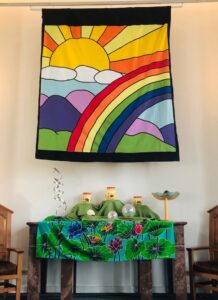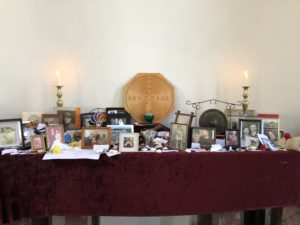What makes you feel at home? What makes you feel welcome? That’s not a rhetorical question. Really … what makes you feel welcome and at home?
I read an article this week in which the author pondered this question. She came to the conclusion that she felt most at home, most welcome, when the place looked like someone lived there.
“The homes in which I’ve felt the most at ease have been the homes that feel lived in. They are the ones that are not perfectly clean or perfectly decorated. Now don’t get me wrong; they aren’t filthy either, but a little dust on the furniture and a few stray items cluttering up the counter top almost make me breathe a sigh of relief. The house is inhabited by real people! On the other hand, when I enter a house that looks like a show piece, I spend most of my time holding my breath, worrying about ruining something, especially if the kids are with me! It’s stressful enough to bring your children to someone else’s home without having the added stress of perfection to deal with.”
Then she asked herself what she did to try to make people feel welcome. You might have guessed that she cleans the place top to bottom, making sure that there is no dust anywhere. She puts away everything and sets the pillows on the couch “just so.” (I added that last part, but I feel certain that she does.) My paternal grandmother, Maria Quanstrum, put those plastic covers on all of the fabric covered furniture, and kept them on even when company came. My dad said that that’s one of the reasons he never brought any of his friends over to the house – he knew they wouldn’t feel comfortable, wouldn’t feel welcome.
What makes a person feel welcome? How can we make a person feel welcome? How can we actually be welcoming, as we say we strive to be?
It had been my intention to dance with those questions as they relate to our lives as individuals, and as a community. Yet recent events have led me down a different path.
The other day my son said to me something I never said to my father, “Did you hear that there was another shooting?” Mass shootings happen so frequently today that they’re in some ways becoming part of the background noise of his life. “Did you hear that there was another shooting today, dad?”
It wasn’t like this when I was growing up. Oh I am sure that it was more like this than I knew. There wasn’t the same kind of from-every-direction-at-once 24/7 coverage, and in those days (“the Before Times” as my kids call it), parents tended to shield their kids from the ugliness in the world in a way that not all parents do today. Nonetheless, I do think that there’s been a real change.
We’re 11 weeks into 2019, and already there have been 58 mass shootings (defined as more than 3 people being shot in the same place at generally the same time). 58. And there have been 11 times when there was more than one mass shooting on the same day! On January 26, on that one day, there were 4 separate mass shootings – in Georgia, New Jersey, Indiana, and Louisiana – that left 12 people dead. On one day.
Shopping malls, movie theatres, outdoor concert venues, schools, churches, synagogues, mosques – these were places of relative safety when I was a kid. I say “relative” because the places I, as a white person, felt safe were not always safe for women, people of color, homosexuals, trans people … Yet even taking that into consideration, I do believe that there has been a quantitative shift, and a qualitative shift in life in the U.S.
I’ve talked with a number of you over the past few years, and you’ve told me – not exactly in these words – that you just don’t know, just don’t understand, what’s going on in the world anymore. That the world as it is today doesn’t make sense to you, and that it doesn’t feel like “home” anymore.
Just a few months ago a gunman opened fire in the Tree of Life synagogue in Pittsburgh, killing 11 people and wounding another 7. This past Friday a gunman shot and killed 50 people in two mosques this past week, shouting words of hatred as he released destruction and death. He filmed the whole thing, streaming it on Facebook live as it happened.
Two summers ago there were actual tiki torch carrying, robe wearing, klu klux klan members and other white supremacist marching in our streets, rallying in our parks. There is a man in the White House who will not come outand directly, explicitly, and unequivocally condemn white supremacy, misogyny, homophobia, trans-fobia, anti-Semetism, Islamo-phobia … And not only doesn’t he outright condemn these hateful ideologies, he seems to actually embrace and encourage them with winks and inuendoes. Deniable, of course, yet all too disgustingly visible.
Hard won protections for the environment; equal rights for women, people of color, trans people, gays and lesbians, people with physical or mental disabilities, immigrants (just about anyone who isn’t white and well-off); peace on the planet; religious freedom; our country’s relationship with other nations and place in the world; worker’s rights; income inequality … in all of these areas where progress has been made over the past decades (however slowly and incompletely), there is currently regression to former, less fair, less safe, less “welcoming” times.
Mr. Rogers, spiritual father and grandfather to several generations, famously said this:
“When I was a boy and I would see scary things in the news, my mother would say to me, ‘Look for the helpers. You will always find people who are helping.’ To this day, especially in times of disaster, I remember my mother’s words, and I am always comforted by realizing that there are still so many helpers – so many caring people in this world.”
It is so easy to become focused on the shooters in public, private, and sacred spaces; focused on the Islamo-phobes, and the people who desecrate Jewish cemeteries and synagogues with swastikas and other anti-Semitic graffiti; and those servants of the people who leave unarmed black youth lying dead in the street; and those venomous politicians (and preachers) who spew hate; and those men who prey with impunity on women and children … I could go on. It’s so easy to become focused on them. Yet they do not represent humanity. And while I need to stay aware of them, recognize their reality, and actively work against their agendas, I do not have to let them to define the world in which I live. Neither do you. We can follow Mr. Roger’s mother’s advice and “look for the helpers.”
This summer a man name Mamoudou Gassama came across a small crowd of people in the streets of Paris, looking up at an apartment building. When he looked, and saw what they were looking at, he didn’t just stand there. He started running toward the building, because what everyone was looking at was a baby dangling precariously from a balcony. Gassama ran to the building and started to scale it. You can find videos of it, and what he does is really amazing. In almost no time he was at the balcony, and he brought the baby to safety.
Mamoudou Gassama could have stood with the others, staring at the infant’s precarious predicament. Instead, he instinctively ran toward the danger. Especially as an undocumented immigrant from Mali, in France for only six months at the time, he might have wanted to maintain a low profile. But he couldn’t. He was a helper.
The National Public radio program “Radio Lab” devoted an episode to the topic of “heroism,” and there was a story that I haven’t been able to get out of my head. I guess I really don’t want to, because it’s a reminder of the helpers in the world. A man was standing on a subway platform, when another person nearby began having a seizure and fell onto the tracks. The first man, without hesitating, jumped down to help the other one up. When he couldn’t, and when it was clear that a subway was coming, he laid down on top of the other man, holding him down on the track. The subway cars passed over the two men, just grazing the top man’s back. The two men were strangers, yet one risked his life for the other without a moment’s thought.
In the early days of my ministry I was officiating the memorial service of an elderly member of the congregation. During the eulogy his son mentioned that his dad had gotten a purple heart because during a battle he had run out to pull back a wounded comrade. “That’s not what happened!” a voice shouted from the congregation. A little while later, during the open sharing of memories, this man took the microphone. “I’m sorry I caused a commotion,” he said. “But that’s not what happened. He didn’t go out under fire to bring back a wounded member of our unit. He brought the first boy back, and then went out again!”
And on Friday Abdul Aziz ran outside and toward the gunman, shouting “Come here!” He threw the only weapon he could, a credit card machine he’d picked up on the way out. After the shooter had gone back to his car to get another gun, Aziz ducked and weaved among the cars in the parking lot as bullets whizzed by him. He saw a gun that the gunman had dropped, but it was out of bullets, so Aziz threw it like a spear at the shooter’s car, shattering the windshield and scaring the killer away. But Aziz wasn’t done. He ran after the speeding car, stopping only when he couldn’t keep up. Because of him the shooter never got inside the second mosque, which is why the carnage was so much less there.
“When I […] would see scary things [going on in the world around me] my mother would say to me, ‘Look for the helpers. You will always find people who are helping.’ To this day, especially in times of disaster, I remember my mother’s words, and I am always comforted by realizing that there are still so many helpers – so many caring people in this world.”
The haters, the demagogues, the killers, the oppressors, the ones who deny another person’s humanity, the ones who push people to the margins so that they can have the center for themselves, the ones who seem determined to make this world a living hell … they’re real. They exist. And we must do all that we can to see to it that they don’t win the day
The helpers are real too, though. They are just as real. And we must never lose sight of that. We must keep them in their minds and hearts, drawing strength, and courage, and hope from their examples.
One last thought: while reading for this reflection I came across an article in which the author said that Mr. Roger’s mother’s advice is not good advice for us today. He had several reasons, a couple of which I found neither compelling nor convincing, yet there was one that struck me as both true and important enough to share it with you this morning. He noted that simply looking for the helpers is not enough. We need to be those helpers to the extent we can, wherever and whenever we can.
Friends, we can work to make this a world in which all people are truly welcome, a world which all of us can truly call “home.” And not only can we … we must.
Pax tecum,
RevWik












